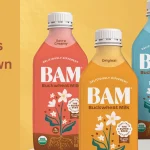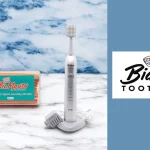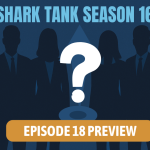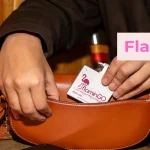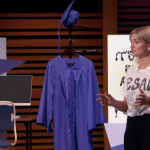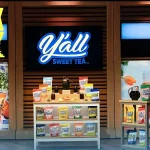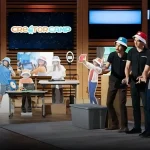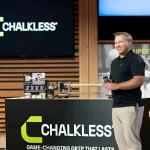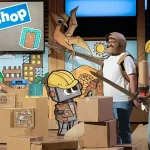Beyond the Tank Episode 204
 Beyond the Tank episode 204 aired Tuesday, April 26, 2016. Three past businesses that received an investment from a Shark are featured. Beyond the Tank episode 204 begins with an in-depth update on PipCorn, a business Barbara invested in during season six. Lori invested in PurseCase, the combination purse/cell phone case, back in season five. There were changes in the ownership, plus a few setbacks. Mark, Kevin, and Robert invested in the peat moss substitute PittMoss back in season six. While production continues, there are many challenges ahead.
Beyond the Tank episode 204 aired Tuesday, April 26, 2016. Three past businesses that received an investment from a Shark are featured. Beyond the Tank episode 204 begins with an in-depth update on PipCorn, a business Barbara invested in during season six. Lori invested in PurseCase, the combination purse/cell phone case, back in season five. There were changes in the ownership, plus a few setbacks. Mark, Kevin, and Robert invested in the peat moss substitute PittMoss back in season six. While production continues, there are many challenges ahead.
Each Episode of Beyond the Tank has these “back stories” and Shark Tank updates. We’ll recap them here.
Beyond the Tank Episode 204 Featured Sharks
- Investor – Lori Grenier
- Investor – Barbara Corcoran
- Investor – Mark Cuban
Beyond the Tank Episode 204 Recap
Pipcorn
Brother and sister team, Jeff and Jen Martin came to season six of Shark Tank with their product, Pipcorn, miniature popcorn that is easier to digest. They were already in 40 Whole Foods stores, and had enjoyed $200,000 in sales. The Sharks called them out on their valuation, when they asked for $200,000 in return for 10%.
Barbara Corcoran bought into Pipcorn. “Pipcorn was worth the $2 million valuation,” she says, “Because the entrepreneurs were so strong. They already had tremendous sales right out of the gate, but they had the potential, in their personalities, to build a huge business. And, who doesn’t love popcorn?”
Seven months after Shark Tank, Pipcorn is in over 600 stores, and is clearing $4 million in sales. The explosive growth has created a problem for Pipcorn. They don’t have a warehouse, so they’re storing the processed Pipcorn in their kitchen and hallway. The siblings are searching for distributors; partners who would store the product in their warehouses, and deliver as the orders come in. The pair is considering whether to choose a smaller, regional distributor, or to work with a large, national distributor. They plan to meet with Barbara to discuss the options.
“Pipcorn is running at maximum capacity right now,” says Barbara. “If they get just one more order, it could break them.”
It’s obvious that Pipcorn’s growth needs to be addressed, before it overtakes the company and sinks the ship. Barbara is concerned with Pipcorn getting lost in a large distributor’s inventory. Currently, sales are at $3.5 million. The pair is aiming for $10-$15 million in a year’s time.
Barbara encourages the pair to continue to grow through smaller, local distributors, while engaging with a large nationwide distributor to get into the big retail markets. She wants Pipcorn’s eggs spread among several baskets, to protect their distribution network. She’s concerned, however, about the current size of their kitchen. She questions whether it’ll be large enough to handle the company’s expansion. Jeff explains that they’ve partnered with a West Coast production company, which not only supplies their West Coast retailers, but supplements their East Coast production. Barbara suggests that they partner with a production company on the East Coast, to reduce storage and shipping costs and to reduce the problems with storage they’re currently having.
The New York City laws limit the sizes of trucks that are allowed, adding more limits to Pipcorn’s potential. Barbara wants them to move the entire operation to New Jersey. “If they don’t move,” she tells them, “It’s going to stunt Pipcorn’s growth.”
Jeff is against moving. He likes the current kitchen for the e-commerce sales, which make up about 25% of the sales. Barbara wants them to move the retail portion of the business, which makes up 75% of the sales, to a commercial kitchen. The pair is reluctant to give up their hands-on operation, which provides work for their current employees.
Barbara offers to introduce the pair to a business acquaintance who runs a large warehouse and distributor in New Jersey. The distributor would give Pipcorn an East Coast connection. Jeff and Jen are impressed with the family feeling of the distributor, and the loyalty of the owners to their employees. Barbara gets Jeff and Jen to agree to revisit the idea of moving to a commercial kitchen in a few months. One problem is solved, and Pipcorn now has room to grow.
“We started in our parents’ kitchen,” remembers Jen. “And now we have an office; we have a warehouse. It’s absolutely incredible. It’s a dream come true.”
PurseCase
Partners Kelley Coughlan-Weaver and Jenn Deese came to Shark Tank in Season 5, with Purse Case. Robert Herjavec, Mark Cuban, and Barbara Corcoran went out instantly, but Lori Greiner called Purse Case a “superhero.” She offered $55,000 for 15%.
“I invested in Purse Case,” says Lori, “Because I thought Jenn and Kelley were great entrepreneurs. They were great partners, they had a ton of passion, drive, and enthusiasm for their product.”
Previous to Shark Tank, Purse Case had done about $30,000 in pre-orders. Post Shark Tank, sales shot up to over $400,000. The partners ran into some difficulties as the business grew. Jenn decided to step away from Purse Case as the relationship between the partners deteriorated under the pressures of the business’ growth. Lori and Kelley bought Jenn’s shares.
In 2014, the business took a hit due to the change in the management, but Kelley is determined to rebuild the company’s early success. She’s planning a strategy meeting with Lori to discuss the future. Lori recognizes the importance of the meeting. “Purse Case is doing a lot of things right,” she says, “But this is a make-it-or-break-it year for Kelley.”
They discuss the loss of Jenn as a partner in the business. Lori encourages Kelley to keep moving forward. Lori’s concerned that Purse Case has not been creating models for Android cases. Android’s Galaxy phones come in a wider variety of sizes and styles than iPhones. Lori is concerned that they’re missing half of the market by cutting out the Android models. Kelley explains that each new mold costs $5,000 to produce, and they simply can’t keep up with Android’s ever-changing line. Lori understands the costs involved, but believes Purse Case needs to continue innovating to stay alive.
“If we don’t innovate, we risk becoming a one-hit-wonder,” says Lori. She loves the cross-body chain accessory, and wants Kelley to talk to Kitson, a large, fashionable retail chain, about what directions Purse Case can expand into.
Kelley and Lori present Kitson’s buyer with a specialized display that hangs the Purse Cases in a spiral design, providing the customer with easy access and an attractive display. The buyer suggests adding a built-in charger to the Purse Case, enhancing the usefulness of the cases and increasing sales.
“People assume that, since I got a deal on Shark Tank with Lori, that I’m a millionaire and that everything is just gravy,” says Kelley. “And, really, after Shark Tank, that was when the hard work really began.”
The hard work Kelley has put in to Purse Case is paying off, and the future looks bright.
PittMoss
Mont Handley started PittMoss in an effort to save the dwindling peat bogs. “PittMoss needs to be successful,” he says. “Because I’ve put everything into this business.” Like many entrepreneurs, Mont has invested his life savings into his company.
He entered the Shark Tank in season 6. He’d sold $22,000 in seven months. He had $168,000 in orders, but couldn’t fulfill the orders due to a lack of capacity. Mark Cuban, Robert Herjavec, and Kevin O’Leary came together to offer $600,000 in return for 35% of PitMoss. Mont accepts, and gets three Sharks for the price of one.
“I invested in PittMoss,” says Mark, “Because even though I didn’t know anything at all about the peat moss business at the time, I like disruptive industries that can turn a business upside down. It seemed, from Mont’s description, that PitMoss could truly disrupt the peat moss industry. If they’re able to do that, the returns could be enormous.”
The Shark’s investment allowed Mont to build production capacity. Although he started out with the intention of focusing on commercial growers, the demand for a product for home gardeners has been huge. Mont is discussing a deal with a distributor that could package PittMoss for consumer sales in large retailers, creating a whole new market for PittMoss.
Mark Cuban is coming in for a meeting, to discuss the expansion plans. Mark advises Mont to offer the distributor a good price per unit, in order to expand further into the market.
Right now, the company is capable of making 40,000 pounds of PittMoss per day, but the distributor would require a 400% increase in production. This growth creates an obvious problem. Mont needs to decide whether to add a new production line, or to move into a deal with a manufacturer. Adding the lines would cost as much as $1 million, capital that PittMoss does not have in the bank. This is not happy news for Mark Cuban. Mont has the capability to increase production by adding more shifts on his line, but Mark wants to know how Mont intends to address the increases in production.
“What I need from you immediately,” he says “Is a spreadsheet that gives me least cost, middle cost, and top of the line. I don’t have a problem giving you more money, but I need those options, so we’ll know what percentage of capacity we’ll hit today, six months from now, and a year from now.”
Mark encourages Mont to keep his focus on replacing peat moss with PittMoss. Mont comes out of the meeting feeling confident going into his meeting with the distributor. Mark has empowered him by discussing the options for increasing his production capacity.
The topic comes up at the meeting with the distributor, and, with Mark’s encouragement, Mont can answer confidently. The buyer has some packaging ideas ready, and they discuss moving into 50 to 100 stores within a year. The deal is looking strong, and PitMoss is on track to grow.
“It’s just an amazing feeling,” says Mont. “How could you not be thrilled to see my little startup brand that I envisioned, next to a totally established, well-known consumer brand. I feel like we’ve got something really solid here.”
PittMoss’s future is firmly rooted in the confidence of the Sharks and the plans for the future.


